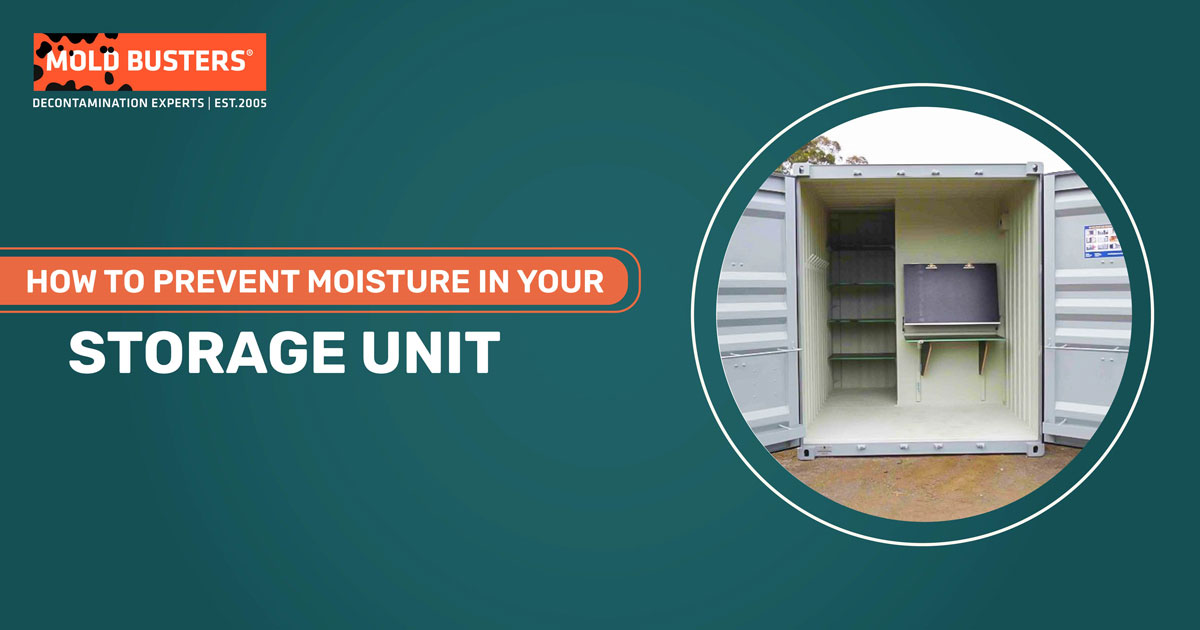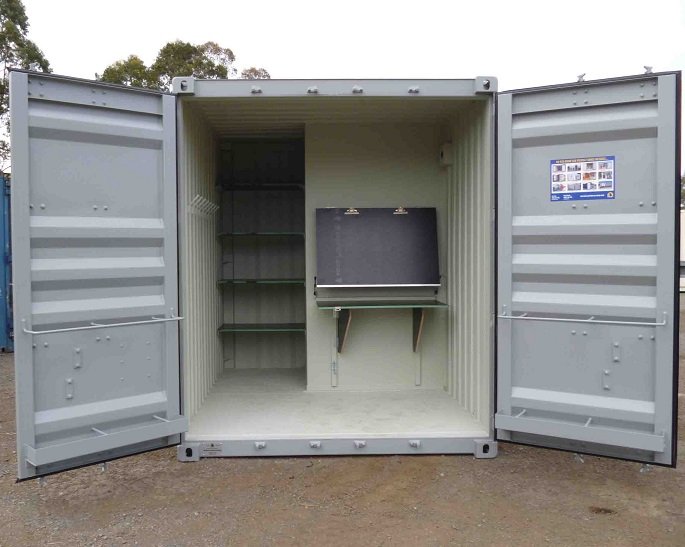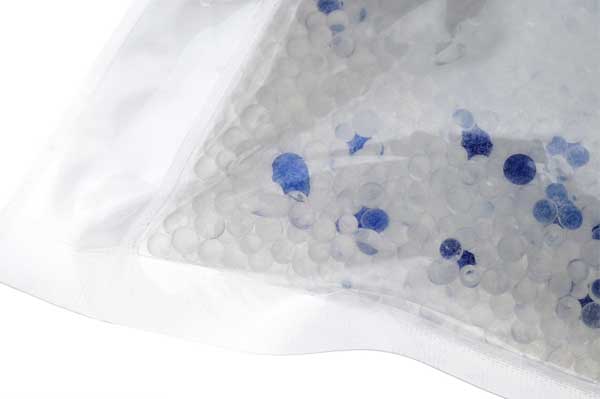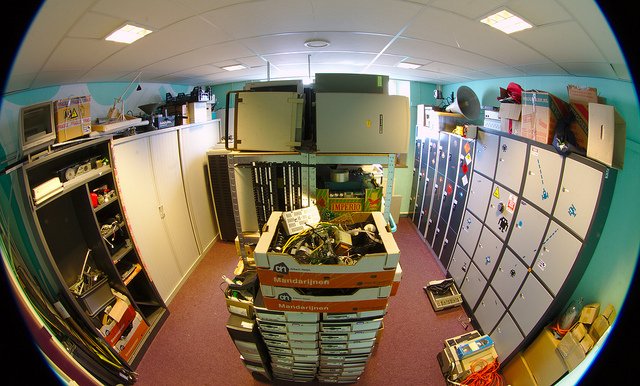How to Prevent Moisture in Your Storage Unit
Comments 15 | 2015 Nov 05 | Author John Ward
Did you know that indoor humidity, or relative humidity (RH), in your home should be between 30% and 50%? Not only is this range comfortable for people, but it also works well to prevent mold and mildew from developing. When this limit is crossed (which happens a lot more often than you’d expect), problems tend to occur.
For example, if moisture starts accumulating in your storage unit, anything you have inside will become susceptible to mold, mildew, corrosion and rust. This can be especially dangerous for stored goods and items of personal value like clothing, photos, wood, leather and electronic appliances.
It is highly recommended that the items you are storing stay protected and safe. Here are some things you can do in order to ensure a moisture-resistant and mold-free storage unit.

Check humidity
It is important that you measure the humidity levels inside your storage unit regularly. Indoor humidity should never exceed 50%.
You can check the humidity level in two ways – either by asking professionals to get it tested or you can install a relative humidity gauge inside the storage unit. Both cases can cost you a penny or two so you should think about what is the best option for you.
Once you get your humidity level tested you will know what your next steps should be. In case the humidity level is high your next step should involve detailed visual check of whole unit (including stored stuff) and, in case you notice mold you will have to call for professional help.
Of course if you didn’t notice mold you can proceed with locating the cause (such as leeks) and taking necessary steps to lower down the level of humidity.
Inspect for leaks
If you plan on using an outdoor storage unit, before you purchase or rent one, check it for potential leaks. Inspect thoroughly for cracks and holes—this is the simplest way to prevent water from entering your storage unit. No matter how small and barely visible the cracks seem, they put your belongings at risk.
Finally, don’t forget to keep checking the storage unit for leaks and other forms of damage ever so often, as outdoor weather conditions and wear can cause new cracks to appear.
Choose your storage unit with care
The best way to fight moisture in your storage unit is to stop it from developing in the first place. Choosing a high-quality, moisture-resistant unit will save you from all the additional worries and stress.
Storage containers are perfectly designed to handle all challenges you might face when storing sensitive items. You also always have room for additional improvements, such as installing vents, air conditioners and windows.

Look for storage units that have moisture-control features.
Make sure your stored items are 100% dry
Have you heard the saying “one bad apple spoils the whole bunch”? Well, it is the same with one damp item—it can ruin all the items in the container or storage unit.
Just one slightly wet item can increase humidity levels and leave the door wide open for mold and mildew to grow on your belongings.
So, before you store your valuables, make sure they are all completely dry with no traces of moisture. This is especially recommended if you’re storing swimming gear, surfboards, etc.
Install a vapor barrier
One more way to damp-proof your storage space is to install a vapor barrier, a polyethylene plastic or foil that is placed on the warm side of the storage wall in order to block outdoor moisture.
This flexible membrane should also be installed beneath the floor to prevent moisture from the ground to seep inside. You can buy a vapor barrier with a permeability value of less than 1.0 in most hardware stores.
Worried About Mold in Your Storage Unit? Get a Free Inspection!
Moisture in your storage unit can lead to mold growth, which is harmful to your belongings and health. Don’t wait until it’s too late! Contact Mold Busters for a free virtual mold inspection. Our experts will provide a thorough assessment and actionable plan to keep your storage space mold-free. Protect your valuables today!
Make your own desiccant
Protect your belongings with materials that absorb moisture. For example silica gel desiccant is a very good moisture absorbent. You can purchase silica gel desiccant or similar materials in the nearest home hardware store or you can make your own desiccant at home.

To absorb excess humidity and control moisture in your storage unit, try making your own desiccant with silica gel.
DIY Desiccant: How To
You will need:
- a piece of fabric and
- silica gel.
Form a pocket out of two square pieces of fabric and fill it with the silica gel. Sew it closed and then hang the bag inside your storage unit.
Finally, remember that you will have to regenerate the desiccant because silica gel can absorb up to 40 percent of its weight. To do so, dry the crystals in the oven.
Use charcoal
If you are looking for more natural alternative to your moisture problem, you may be surprised by the power of charcoal. It is a natural alternative to silicone gel desiccant. Charcoal briquettes absorb not only moisture, but unpleasant odours as well.
Wrap them in fabric, just like crystals, and sew them up the same way you would the silica gel packs. You can also place them on a metal tray, inside a bucket or basket lined with foil or plastic. Replace the briquettes every month or two.
When handling charcoal, you should be careful not to stain some of your belongings, so never put it against items that could be damaged. To protect your possessions from stains and other damage, make sure that your storage unit is well organized.
Protect your things

No matter for how long your belongings are stored away, you want them to be safe, right? Sadly, water and any other type of moisture is not your only concern. Mold is also something you should be worried about.
First, protect your belongings against mold and moisture by keeping them off the ground. Make sure all of your possessions are wrapped in blankets and covered with a plastic sheet that will keep the moisture out. Never put your belongings directly onto a concrete floor because this can lead to condensation. Instead, place your things on top of wooden pallets.
Sometimes, things can get out of your control, and moisture, mold and mildew can find their way into your storage unit. When that happens, you might not have any other choice than to turn to professionals to solve your mold problem. If you’re in the Montreal or Ottawa area, our teams are ready to assist you with comprehensive mold inspection and removal services.
Moisture problems in your storage unit and elsewhere in your home do not have to take over your life. Fight back against mold, mildew and corrosion by being smart, prepared and protected. If you’re unable to have an in-person inspection, we also offer a free virtual mold inspection service to help identify potential mold issues.
Tanvir Mokammel
It is really good concept.
S lynn
Furniture in non climate control for 3 weeks. Expensive sofa covered in plastic but, loosely to breathe. Will be still there 2 more months only. Do I need to worry? Please reply (worried)
Fred's
my 10 x 15 storage unit is Loosely fielded a lot of open air spaces I think that would help cut down the mustiness right?
Rosemary
If my bottled water is showing moisture does that mean it is no longer safe to drink?
John
It depends. It is recommended to drink the opened water bottle after 3-4 days. If the bottle is not opened at all than it is could to stay like that for quite a time (3-4 years), but if kept too long it will have strange smell. In case you refill the bottle with new water from your pipes, you should drink it right away. Otherwise the bacteria will reproduce and make problems to your digestive tract.
Three Tips For Success Storage Unit Packing - came
[…] that storage units that are not regularly ventilated or air-conditioned can collect moisture. Consider using a plastic tarp over the floors and vacuum sealing any materials that are easily […]
Anja
Great tips, thanks for sharing!
Jenny hartshorne
We are building a 10x15 temporary shed in back yard to store our furniture while our renovation is going. Could be there from June-dec. its plywood and 2x4. We installed an Airconditioner to try and keep air conditioned. Should we seal all cracks with insulation, or leave it ventilated for air to get in? Should we put plastic under floor (its on cinder blocks about 8” high) and a bucket of charcoal inside? Should we staple plastic to walls and ceiling? We live in central nj so it can get humid and also snow thanks
John
Hi Jenny! I would suggest to rely on natural air exchange and allow for regular ventilation. If you make your shed airtight, then you would welcome potential mold problems as the humidity will be very high.
Penelope Malcolm
Hi Jenny! Believe it or not, those little humidity absorbers they sell at The Dollar Store for $1 work beautifully! I went online and bought a case of them and spread them all over. They last quite a while too.....depending on the humidity, of course:)
Alice Carroll
Thanks for the tip that having a vapor barrier can help me keep mold off of my self-storage unit rental. I plan to rent one in order to have a safe place to store my older books. Since I will be storing items that can be damaged by moisture, I think being able to avoid molds is an added bonus if I am diligent in controlling the moisture levels of the unit.
Gwen
Do i have to worry about mold in a climate controlled unit in southern california for 6 months storage time?
Misha
Hi Gwen, For the most part, no. Mold is a concern when there are large temperature differences between environments. In your case, the storage unit is climate controlled, and so, the risk of condensation or moisture forming is low. But you'll want to make sure that the items that you are storing themselves are not wet or damp.
Jason
I bought a storage container then place insulation board on the inside cut a hole put and ac unit in which i keep at 72. I have been using damp rid on a reg. basis, however i just had mildew start showing up on clothing that is hanging up. Any ideas on what I did wrong?
Misha
Hi Jason, It's difficult to assess the situation or diagnose the issue without being there in person to identify all of the factors that may have contributed to the mold growth. If you're in one of our service areas, please feel free to contact us for a mold inspection. If not, consider hiring a local mold inspection and removal company to perform a visual assessment of your storage unit.